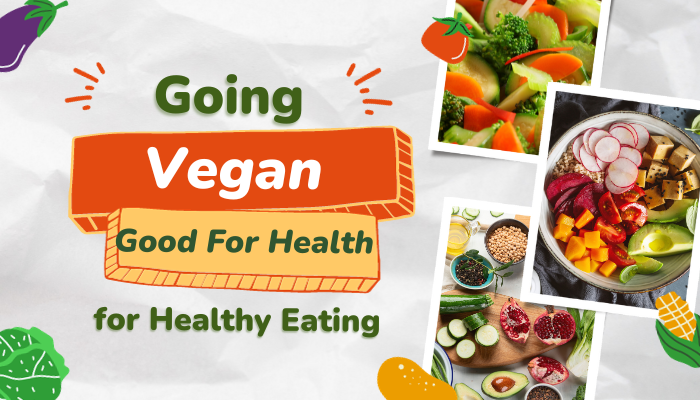The Pros and Cons Of Going Vegan Good For Your Health?

The Pros and Cons Of Going Vegan Good For Your Health?

Going Vegan Good For Your Health?
Deciding to go vegan is a major lifestyle change that takes commitment and adjustments. Many people choose to go vegan for ethical reasons related to animal welfare or the environment. However, health is also a top motivator for adopting a vegan diet. But is going vegan actually healthy and Going Vegan Good For Your Health? What does the science and research say about the health impacts of eliminating all animal products? This comprehensive guide takes a detailed, evidence-based look at the pros and cons of veganism for your health.
Defining Veganism
First, let’s clearly define what constitutes a vegan diet. Vegans strictly avoid consuming any animal-derived foods or products including:
- Meat, poultry, fish and seafood
- Dairy products like milk, cheese, yogurt, etc.
- Eggs
- Honey
- Gelatin
- Some food colorings
- Leather, wool, silk, down, fur
- Soaps, cosmetics and other products tested on animals
Vegans eat a predominantly plant-based diet, fueling their bodies on fruits, vegetables, whole grains, nuts, seeds, legumes, plant-based milks and proteins like tofu and tempeh. It takes dedication to cut all animal products out of your lifestyle.
The Health Benefits of Veganism
Many major health organizations endorse plant-based vegan and vegetarian diets as healthy, nutritionally adequate for all stages of life and possibly protective against chronic diseases. Here are some of the evidenced-based health perks associated with plant-exclusive vegan diets:
Lower Risk of Obesity and Weight Loss Multiple large observational studies including Adventist Health Study-2, the Nurses’ Health Study and more found lower rates of obesity and more significant weight loss overtime among people following vegan and vegetarian diets compared to omnivores. These effects held true after adjusting for socioeconomic status, activity levels and other demographic factors. Researchers believe plant foods’ higher fiber content and lower calorie density support healthy weights.
Decreased Risk of Cardiovascular Disease
According to a 2013 meta-analysis published in the American Journal of Clinical Nutrition, vegetarians and vegans have 29% reduced risk of developing or dying from heart disease compared to meat eaters. Whole plant foods contain zero cholesterol naturally and more protective fiber, antioxidants and nutrients. Plant-exclusive diets have been shown to reduce blood pressure, LDL “bad” cholesterol and inflammation – top risk factors for cardiovascular disease.
Lower Blood Pressure
Speaking of blood pressure, eliminating meat and dairy is consistently associated with lower blood pressure levels in observational studies. Researchers suspect plant protein sources associate with reduced blood pressure while some amino acids abundant in meat may elevate blood pressure.
Reduced Type 2 Diabetes Risk
Multiple studies link high consumption of processed and red meat with increased risk of developing type 2 diabetes. Replacing meat with more nutritious whole plant foods appears protective against insulin resistance and diabetes. One 2011 study calculated just over 50% reduced diabetes risk in vegans and vegetarians compared to omnivores after adjusting for body weight. Whole grains, fruits and vegetables support healthy blood sugar regulation.
Decreased Cancer Risk
Research demonstrates that higher consumption of fruits, vegetables, whole grains and fiber – key components of plant-based diets – associates with decreased cancer risk. The World Health Organization recently reported processed meat causes colon cancer and red meat is a probable carcinogen. Eliminating these products may reduce cancer risk while emphasizing protective plant foods. Population studies demonstrate lower rates of common cancers among vegetarians and vegans.
Increased Fiber Intakes
Common nutrient shortfalls in the standard American diet include vitamin D, calcium, magnesium, fiber potassium and more. Plant-exclusive diets often naturally meet more recommended dietary targets as whole plant-based foods are packed with essential vitamins, minerals and dietary fiber. Transitioning from the standard American diet to a vegan diet more than triples fiber intake according to Academy of Nutrition and Dietetics estimates. A high-fiber diet feeds good gut bacteria to support immunity, digestion and systemic health.
Potential Drawbacks and Risk Factors
Of course, eliminating entire food groups requires more mindful eating habits to meet nutrient needs. Potential pitfalls of plant-based diets include:
Increased Risk of Nutrient Deficiencies
While planned appropriately vegan diets can meet all nutrient needs, there are some possible deficiency risks requiring awareness and management. Nutrients vegetarians and vegans must pay special attention to include:
- Protein: Beans, legumes, tofu, tempeh, edamame, nuts, seeds, quinoa and amaranth provide ample plant-based protein. As long as calorie needs are met, most vegans easily exceed requirements. Still, inadequate protein hinders immunity, wound healing, muscle retention and more.
- Iron: Decreased iron associates with impaired oxygen transport and weakened immunity. Pair plant sources like lentils, spinach and cashews with vitamin C to boost absorption.
- Vitamin B12: Only found naturally in animal foods, vegans must supplement B12 with fortified foods or a supplement to prevent neurological damage and impaired red blood cell production.
- Calcium: While leafy greens contain calcium, their bioavailability is limited. Fortified plant milks provide ample calcium but surveying needs is prudent. Low calcium detrimentally impacts bone metabolism and strength.
- Zinc: Legumes, whole grains, nuts and seeds contain zinc. Monitor intake given its importance for immune function, growth and development.
- Vitamin D: Produced by sun exposure, few foods supply vitamin D naturally. Most bodies require supplementation to prevent compromised bone health.
- Omega-3s: Algae supplements and flax and chia provide essential fatty acids. Support cognitive, cardiovascular and immune wellness through adequate intakes.
Increased Processed Food Intake
When transitioning from an omnivorous diet, relying too heavily on mock meats and highly processed packaged foods can negatively impact health. While occasional indulgences fit an overall healthy dietary pattern, emphasize whole foods like vegetables, fruits and ancient grains instead.
Potential for Disordered Eating
Some worry extreme dietary restrictions intrinsic to veganism enable disordered eating, though evidence remains conflicting. Regardless of dietary pattern, fully restricting any foods risks fostering an unhealthy relationship with food. Mindful, compassionate eating that honors health guides sustainable change.
Increased Restrictiveness and Isolation
For some, eliminating all animal products proves restrictive and challenging socially. But with sound education, planning, proper supplementation and support, plant-based regimens can fit all needs, values and tastes.
The EAT Lancet Report and Its Review of Plant-Based Diets
Synthesizing research from around the globe, the EAT Lancet Commission developed science-based targets for healthy and sustainable dietary patterns to support human and environmental wellbeing. Their report, published in prestigious medical Journal The Lancet, promotes predominantly plant-based flexitarian, vegetarian and vegan diets rich in fruits, vegetables, whole grains, legumes, nuts and seeds as optimal for human health and longevity. The commission’s targets emphasize fiber-rich carbohydrates over meat for reduced risk of obesity and nutrition-related chronic diseases like diabetes, cancer and cardiovascular disease.
Their review mirrors consistent evidence demonstrating whole food plant-based and vegan diets adequately support healthy growth and development when balanced thoughtfully. As the global population continues expanding exponentially, adopting more plant-centric sustainable dietary patterns promotes resilience according to the report.
FAQs: Veganism and Health
Still have questions about the health impacts of plant-exclusive vegan diets? Explore answers to frequently asked questions about vegan nutrition below.
Can you be healthy long term on a vegan diet?
Yes, ample research demonstrates balanced, reasonably well-planned vegan diets sustain health across all life stages. Individualized needs dictate optimal nutrition plans. Consulting a registered dietitian specializing in plant-based nutrition helps troubleshoot. Thorough vegan meal planning centered on whole grains, legumes, nuts, seeds, fruits and vegetables supports enduring wellness.
Do vegans live longer?
Limited research makes definitive conclusions challenging regarding veganism and longevity. However, evidence links plant-predominant diets with decreased risk of life-shortening conditions like obesity, cardiovascular disease and cancer. Avoiding common chronic diseases through vegan diets may contribute to longevity. Confirmation requires further dedicated study in vegan populations.
Is the vegan diet more healthy?
Overall, evidence demonstrates balanced vegan diets centering whole plant foods empower meeting most nutrient targets when thoughtfully planned. Compared to standard American diets, vegan and vegetarian patterns associate more closely with healthy dietary recommendations and reduced risk of major chronic preventable diseases. Individual factors impact health effects experienced from eliminating animal foods.
Can I get enough protein from a vegan diet?
Absolutely. Varied high protein plant-based foods like legumes, nuts, seeds, ancient grains and tofu readily meet requirements. As long as ample energy is consumed through sufficient calories, nearly all vegans naturally satisfy protein needs. Combining complementary amino acid profiles by pairing rice with beans, hummus with pita and nut butter with crackers enables complete protein intake too.
Will a vegan diet make me deficient?
Like any pattern, plant-based diets require awareness and consistency hitting nutrition targets. Carefully balancing wholesome carbohydrates, plant proteins and fats prevents common deficiencies. A dietitian helps tailor eating plans complimentary values, needs and preferences while strategically supplementing where necessary.
Takeaways: Can Vegan Diets Support Health?
Veganism requires eliminating all animal products from your lifestyle – no small feat! Without dairy, eggs, meat or seafood, thoughtfully navigating nutritional needs is essential, as is proper preparation, fortified foods and strategic supplementation. When skillfully planned and balanced, whole food plant-based and vegan diets meet requirements and support positive health outcomes. In fact, increasing research touts vegan eating as protective against obesity, high cholesterol, hypertension, heart disease, diabetes and numerous cancers.
If considering veganism, collaborating with a registered dietitian optimizes transition success. An expert makes navigating uncharted nutritional territory smooth sailing. They personalize recommendations complimenting your routines while problem solving challenges. A dietitian also regularly reviews intake, labs and symptoms to ensure nourishment meets unique needs, values and tastes. Teaming with a provider prevents deficiencies and burnout while discovering satisfying staples.
With education and dedication, plant-exclusive regimens sustain wellness across the lifespan. Prioritizing more potent whole food sources over processed pretend meats supports lasting results as does embracing realistic balance. Veganism affects more than physical health with ethical, environmental and social implications – topics better unpacked separately in more depth and going vegan good for your health. When prepared skillfully, vegan diets offer protective benefits empowering and inspiring conscious eaters.




